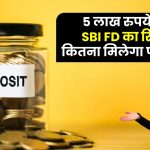
Fixed Deposits (FDs) have long been a preferred savings instrument for Indian investors. But for senior citizens, these schemes come with even greater benefits. If you’re 60 or older, here’s some good news: you can now double your profit on FD investments thanks to higher interest rates and increased TDS exemptions on interest income up to ₹1 lakh.
Whether you’re planning for retirement, securing regular income, or safeguarding your savings from market volatility, understanding these new benefits can make a significant difference. In this guide, we break down everything in simple terms—with numbers, official links, and real-world examples—so you or your loved ones can make the most of these opportunities.
Now Double the Profit on FD
| Feature | Details |
|---|---|
| Extra Interest for Seniors | Up to 0.75% higher than regular FD rates |
| TDS Exemption Limit | Increased from ₹50,000 to ₹1,00,000 per year (effective April 1, 2025) |
| Best Bank FD Rate for Seniors | Up to 8.25% (IndusInd Bank) |
| Investment Safety | Covered under DICGC insurance for up to ₹5 lakh per bank |
| Ideal for | Risk-averse retirees, pensioners, and conservative investors |
For senior citizens, FDs are now more rewarding than ever. With higher interest rates and doubled TDS exemption limits, your savings work harder and smarter. Whether you’re planning for retirement or just want steady income with zero risk, a well-chosen FD can be a powerful tool.
What’s New for Senior Citizens in Fixed Deposits?
1. Higher Interest Rates on FDs
One of the biggest advantages seniors enjoy is preferential interest rates. Many banks provide up to 0.50% to 0.75% more than regular depositors.
Here are a few examples:
- IndusInd Bank: Up to 8.25% p.a. for senior citizens
- SBI: Offers 0.50% extra over standard FD rates
- HDFC Bank: Up to 7.75% interest for select tenures
Tip: Always compare FD rates across banks before investing. Even a 0.25% difference can translate into thousands of rupees over time.
2. New TDS Exemption Limit of ₹1,00,000
Earlier, banks deducted TDS (Tax Deducted at Source) if the interest earned on FDs exceeded ₹50,000 annually. Starting April 1, 2025, this limit has now been doubled to ₹1,00,000 for senior citizens.
This means you can earn interest up to ₹1 lakh a year from FDs without any tax being deducted at source—a huge relief for retirees depending on FD income. To avoid TDS, submit Form 15H to your bank at the beginning of the financial year.
see also: Has the Golden Time for Making FD Passed?
Why This Matters: Real-Life Example
Let’s say Mr. Sharma, a 68-year-old retiree, invests ₹10 lakh in an FD at 7.75% interest:
- Annual Interest = ₹70,000
- No TDS deducted, as it’s below the new ₹1 lakh threshold
- If he had invested under the older limit (₹50,000), he’d lose a part of his interest to tax unless he filed for a refund
By simply being informed and choosing the right scheme, Mr. Sharma gets full access to his interest income.
Step-by-Step Guide: How to Make the Most of FD as a Senior Citizen
Step 1: Choose a High-Interest FD Scheme
Look for banks offering 8% or higher to seniors. You can use official bank websites or FD comparison portals like BankBazaar.
Step 2: Decide the Right Tenure
- Short-term FDs (1-2 years) provide liquidity
- Long-term FDs (5+ years) offer stability
Many banks give higher interest for specific tenures like 999 days or 21 months. Choose smartly.
Step 3: Submit Form 15H to Avoid TDS
- Visit your bank or submit it online
- You must be 60 years or older to file Form 15H
- This form ensures no TDS is deducted if your income is below the taxable limit
Step 4: Consider Monthly Interest Payouts
If you’re relying on this income, choose the monthly payout option instead of cumulative. It helps with monthly expenses.
Step 5: Diversify Across Banks
Remember: Each bank account is covered by DICGC for deposits up to ₹5 lakh. Spread your funds across banks for extra safety.
Other Benefits for Seniors with FD Investments
- Senior Citizens Savings Scheme (SCSS): Offers 8.2% interest with a 5-year lock-in, backed by the Government of India.
- Post Office Monthly Income Scheme (POMIS): Steady monthly payouts for retirees
- Tax Benefits: Up to ₹1.5 lakh deduction under Section 80C for 5-year tax-saving FDs
see also: How Much Interest Will You Get in Post Office Saving Account?
Now Double the Profit on FD FAQs
Q1: What is the new TDS exemption limit for senior citizens in FY 2025-26?
From April 1, 2025, senior citizens can earn up to ₹1,00,000 in interest income from FDs without TDS.
Q2: Which bank gives the highest FD rate to senior citizens?
As of now, IndusInd Bank offers up to 8.25% p.a.
Q3: Do I need to submit Form 15H every year?
Yes, to avoid TDS every year, you must submit Form 15H at the beginning of each financial year.
Q4: Is FD interest fully tax-free for senior citizens?
No, it is exempt from TDS up to ₹1 lakh, but still taxable if your total income crosses the basic exemption limit. You may need to file ITR accordingly.
Q5: Can I invest in FDs online?
Yes, all major banks offer online FD booking, including for senior citizen-specific schemes.











